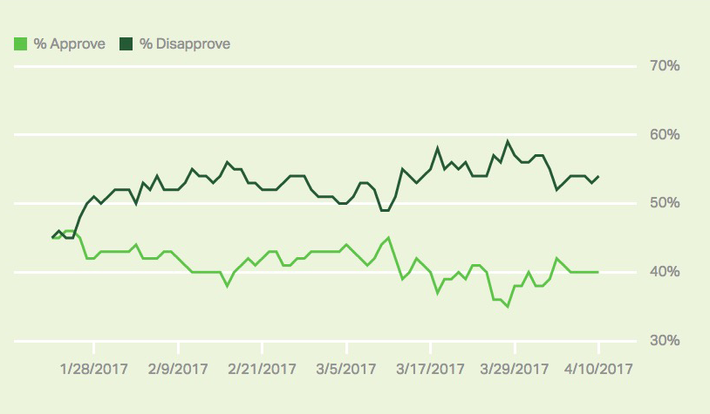
Last night, a pro-choice Democrat who proudly aligned himself with a self-avowed socialist almost won the House district where Koch Industries is headquartered.
Back in November, Kansas’s fourth district backed Donald Trump by 27 points and then-GOP congressman (now CIA director) Mike Pompeo by 31. Five months later, Republican Ron Estes needed a visit from Ted Cruz, a robocall from the president, and an infusion of national money to secure a seven-point victory over the aforementioned Democrat, James Thompson, a Wichita civil-rights lawyer who has never held public office.
That 24-point swing wasn’t enough to shake the red off Kansas — but if Democrats can swing every congressional district by half that sum, they’ll take back the House in 2018.
Naturally, Republicans are eager to paint last night’s vote as an anomaly — one that says less about their party’s national liabilities than it does about its local ones. Kansas’s GOP governor Sam Brownback boasts a woeful 27 percent approval rating, thanks in large part to gaping holes in the state’s budget. Estes was Brownback’s state treasurer. In other words: Estes wasn’t just running as a member of an unpopular governor’s cabinet, but as the one most closely tied to Brownback’s biggest failure. Republicans might point out that, if anything, the fact that the treasurer of a state with wrenching budget problems won at all is a testament to the GOP’s vitality! This is fine! America is already great again!
There are a couple problems with that story. To name the most obvious: The past three months have been replete with evidence that the Democratic base is highly mobilized. You can see it in the record-setting marches, town-hall protests, massive traffic enjoyed by left-wing Facebook pages, the tight special-election race in Georgia’s sixth district, and in the $150,000 that the liberal blog Daily Kos convinced its readers to pony up for Thompson’s long-shot campaign.
But okay, let’s ignore all that. Let’s stipulate that last night was all about Brownback. That would certainly offer vulnerable House Republicans short-term comfort. But in the long run, a repudiation of Brownback is just as, if not more, threatening to the Republican Party than a repudiation of Trump would be.
Because Sam Brownback isn’t unpopular for idiosyncratic, personal reasons; the governor didn’t decimate his state’s finances by spending public funds on sex workers. He did it by implementing the conservative movement’s blueprint for utopia.
Some readers may be familiar with the legend of the “red-state model,” but for those who aren’t, here are the Cliffs Notes: The 2010 tea-party wave delivered Brownback to the Sunflower State’s governor’s mansion and Republican majorities to both houses of its legislature. Together, they passed massive tax breaks for the wealthy and repealed all income taxes on more than 100,000 businesses. They tightened welfare requirements, privatized the delivery of Medicaid, cut $200 million from the education budget, and eliminated four state agencies and 2,000 government employees. In 2012, Brownback helped replace the few remaining moderate Republicans in the legislature with conservative true-believers. The following January, after signing the largest tax cut in Kansas history, Brownback told The Wall Street Journal, “My focus is to create a red-state model that allows the Republican ticket to say, ‘See, we’ve got a different way, and it works.’”
The GOP’s national leadership agreed: Voters should look to Kansas to see the Republican vision for the nation’s future. “This is exactly the sort of thing we [Republicans] want to do here, in Washington, but can’t, at least for now,” Senate Majority Leader Mitch McConnell said of Brownback’s Kansas. And the supply-side nostrum undergirding the governor’s economic model — that massive tax cuts for the rich will pay for themselves, via heightened economic growth (provided that you kick the undeserving poor out of their welfare hammocks) — is the same one on which all of Paul Ryan’s celebrated budgets are based.
Of course, the GOP’s “different way” didn’t work. Instead of providing national Republicans with a winning advertisement for fiscal conservatism, it provided Kansas’s government with giant revenue shortfalls, its economy with weaker job growth than in neighboring states, and Brownback himself with one of the lowest approval ratings of any governor in America. For decades now, Republicans have been asking voters to trade pieces of their social safety net for stronger economic growth. Kansas took them up on it: The state government was able to throw more than 1,000 disabled Kansans off Medicaid, cut millions from the state’s university system, and, in some of its districts, shorten the K-through-12 school year.
Here is their reward.
So to say that Kansas didn’t swing against the GOP because of Trump, but, rather, because of Brownback, is to say that red America isn’t souring on one particular Republican — it’s souring on the party’s entire economic philosophy.
Last year, the Republican Party nominated a man who campaigned on a promise to deliver universal health care, preserve Social Security and Medicare, and intervene in the free market to protect American jobs. Last month, Republicans in the Kansas legislature passed a bill to expand Medicaid in their state.
President Trump has never been popular. But his approval rating began sliding in early March, right after Ryan unveiled his plan to finance a large tax cut for the rich by throwing millions of low-income people off their health insurance — an idea that enjoyed the backing of 17 percent of the electorate.

These are not coincidences. They are testaments to the GOP’s fundamental weakness, the one they compensate for using gerrymandered districts, voting restrictions, fraudulent promises, defamatory conspiracy theories, and increasingly garish appeals to white racial resentment: Republican voters no longer want to buy what misanthropic billionaires pay their leaders to sell them. Not even in the Koch brothers’ backyard.






























